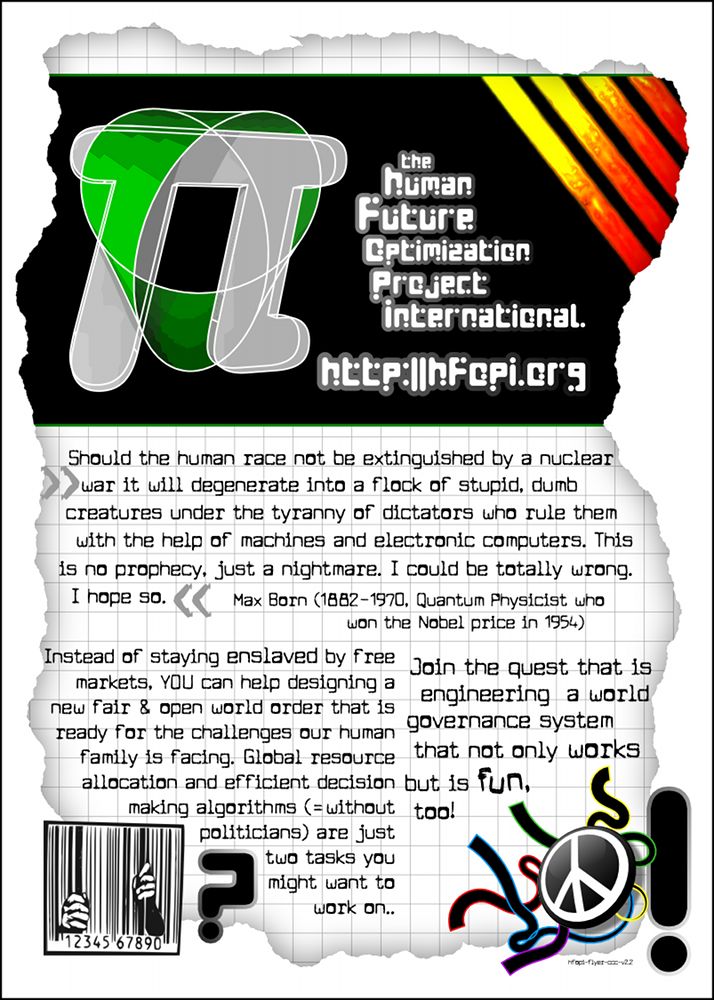Constitutive Theses (2008-12-27)
All men are created equal.
We are all born helpless, crying and naked.
Every human being shares the same basic needs.
Clean water, sufficient nutrition, social security and emotional satisfaction are essential for all conscious life forms.
A person can only justly demand that which he is willing to grant to others.
If one desires to be treated with respect, he must himself act respectfully towards everybody else at all times. If one does not want to be harmed by others he may not inflict damage on anyone else.
A single person benefits from being incorporated within a community.
After Hobbes, that is the reason why individuals group together to form societies (even though it's not always easy, or necessarily true at all).
The topmost goal of a society's governance system should be to benefit its people.
This implies care for each individual's sentiments and maximization of material output performance while minimizing short-, middle- and long-term damage.
The current political/economical system is not effectively fulfilling these duties.
Too many people are suffering (both emotionally and physically) while at the same time the natural environment (which is the precondition to our existence) is being destroyed bit by bit.
Regarding non-trivial issues, a state of perfection can never be reached in reality.
No form of society can achieve 100% guaranteed happiness and satisfaction for all individuals at all times; trying is the best it can get.
Nonetheless, at least one governance system is thinkable that is more adequately constructed than the current one.
A new global governance system can be established through the united effort of the majority of human beings.
Regardless of the political situation in the distinct nations of the world – if the majority of 6+ billion men and women make the decision to paint all streets on earth pink, that is a statement with resoluteness.
The economic/human cost of keeping the current governance system is larger than the effort required to switch to a new one.
Our society is currently moving towards the point at which it will fall prey to its own unsolved issues – blindfolded, with exponentially increasing speed. Any required amount of effort to prevent that should be worth it.
Time is running out.
The longer we wait, the bigger existing problems will grow. New challenges will pop up, perhaps some in which we need to act concertedly on very short time scales.
A political system should not be based on persons, but derive decisions from reason and factual argument.
Today, politicians often decide on topics about which they are only briefly informed by other people, often with an interest of their own, which leads to manipulation through misinformation or even corruption. Furthermore, political compromises have to be made, meaning that objectively unrelated issues are often bundled to law and regulation packages. Cumbersome changes (which often would be necessary to tackle the root source of the problem) are sacrificed for seats in parliament and continuity of political dominance. Voters are most attracted to parties that promise the land of milk and honey while at the same demanding tax cuts. Altogether this leads to a situation where only on rare occasions the right thing is done at the right time.
The quality of an idea or thought is totally independent from its origin.
A governance system should be designed such that the best idea (regardless of being outspoken by an 8-year old girl or an honored professor) has the highest chance of being put into practice.
At the beginning of the 21^st century, mankind has the technological ability to fulfill the basic needs of each and every human beings on earth.
Consider giant underground grain and algae farms powered by fusion power… This planet can feed as many people as fit on the surface.
An economical system based on competition wastes a lot of resources.
Duplicate efforts in research, education and literature thanks to patents and copyright.
Trying to improve upon a sufficiently broken system is a waste of time.
Imagine a machine in a factory producing a certain product. It has long passed its best times, and with age and wear comes ever shorter intervals between breakdowns and standstills. The machine is loud, produces a lot of scrap, wastes resources and is slow and inflexible. However, it still works and is serviced and repaired where needed. So is it a good idea to keep it up and running until it fully breaks down, or should it instead be modernized and overhauled (causing a stop in production during that time)? Wouldn't it be the best solution to design a new machine from scratch – goal oriented and under consideration of the gathered experience – while the old one is still running?
Appropriately exercised, teamwork yields better cumulative results than the principle of competition.
Competition on the fields of education, research, engineering, product development and health care may seem to work well at first. But imagine what jump start would be caused by releasing the brakes (such hindrances for full-scale collaboration as patents, copyrights and money in general)…
Archived Propaganda (2008-2013)
